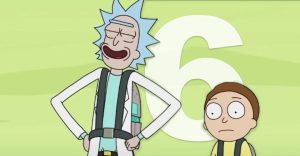Fatal Affair Ending & Sequel Setup Explained

WARNING: Spoilers for Fatal Affair.
Now streaming on Netflix, Fatal Affair ends like most erotic thrillers and teases a potential sequel. Director Peter Sullivan hits the usual genre story beats, allowing for a viewing experience that’s similar to the one provided by Secret Obsession – the filmmaker’s previous film for the streaming service. Even though Fatal Affair includes an overt cliffhanger, there’s a subtle visual that may explain the inevitable sequel’s story.
Fatal Affair stars Nia Long as Ellie Warren, a married San Francisco lawyer who plans to leave her firm after one final case. At home, she tends to her architect husband Marcus (Stephen Bishop), who has suffered physical injuries that aren’t explained until later in the film. The couple have a teenager daughter, Brittany (Aubrey Cleland), who returns home after her freshman year of college. At work, Ellie discovers that a former college classmate, David Hammond (Omar Epps), has been hired as a tech consultant for her final case. Fatal Affair teases a romantic past between Ellie and David, with the latter becoming increasingly aggressive with sexual advances until the two ultimately kiss, if only briefly. Ellie is clearly intrigued by David, but returns home to her loving husband. The Netflix thriller kicks up a notch when David won’t take “no” for an answer.
In Fatal Affair, David’s tech expertise allows him to stalk Ellie from afar, all the while trying to ignite a romance despite numerous rejections. Early on, it’s revealed that David must attend court-ordered anger management sessions, and that he has unresolved feelings for his ex-wife. Epps’ character forms a romantic relationship with Ellie’s friend Courtney (Maya Stojan), which gives him access to the Warren’s home upon secretly crashing a party as a plus-one guest. When Ellie flips the script and begins tracking David, she spots him golfing with her husband Marcus. It’s then heavily implied that David attempted to kill Marcus by hitting him with a vehicle, explaining the cause of the man’s severe injuries that aren’t clarified in the first act. Meanwhile, Ellie warns Courtney that David most likely killed his ex-wife, Deborah (KJ Smith), which prompts Epps’ character to unleash his wrath on the entire Warren family.
What Happens In Fatal Affair’s Ending

Fatal Affair‘s ending begins when Ellie breaks into David’s apartment, which at once reveals an obsessive tech room while setting up a moment that pushes the stalker over the edge. During a phone call, Ellie finally manages to convince Courtney that David is indeed dangerous, and then uses technology as evidence against the tech expert. Dave then attacks his girlfriend Courtney and flees. According to an investigator, Ellie’s stalker admitted his crimes to a therapist and expressed suicidal thoughts. Ellie then admits her transgressions to Marcus, who isn’t pleased but accepts his wife’s apology. Marcus is stern… stern but fair. What the couple doesn’t realize is that David faked his death.
In order to mislead authorities and the Warrens, David kills a homeless man and burns the corpse. Now, there’s a body to match David’s alleged suicide story, which lets him navigate under-the-radar and stalk Ellie once again. Only now, he’s a little more devious with this methods. He uses Ellie’s receptionist (whom he also kills) to call her back to the office, and then terrorizes Ellie by implying that he’s going to kill her husband and daughter (“You left them alone”). Like so many thrillers, there’s cat-and-mouse element here. Ellie is confronted with a fight or flight situation. Naturally, she heads back home to protect her family, and discovers that Brittany’s friend has been attacked. The Netflix movie ends with Ellie and Marcus launching a joint attack on David, who is stabbed and later falls from a cliff (presumably to his death). Two months later, Brittany leaves for college and her parents wave goodbye, with a real estate sign showing that they plan to move.
How Mental Illness Affects David’s Actions

On the surface, David appears to be an over-confident stalker – and he is indeed that. But a late-movie moment reveals that he’s been diagnosed by his therapist as having “Narcissistic Personality Disorder” – a “textbook case,” as she puts it. According to the Mayo Clinic, NPD is “a mental condition in which people have an inflated sense of their own importance, a deep need for excessive attention and admiration, troubled relationships, and a lack of empathy for others.” This explains David’s rage and partially attributes his violent behavior, as it’s implied he did indeed kill his wife and her boyfriend (in the film’s opening scene).
As for Ellie, she doesn’t pick up on a major red flag when she’s first reunited with David at work. He’s immediately flirty, despite knowing that Ellie is married to Marcus. David also continually speaks negatively about Ellie’s husband, and clearly wants to break up their marriage. To viewers, David’s aggressive behavior could make him seem like a cocky bachelor lacking self-awareness. In reality, he’s struggling with NPD but refuses to be held accountable for his actions. David killed at least two people before trying to kill Ellie’s husband, and feels entitled to force himself into Ellie’s personal life. In many ways, David is a megalomaniac.
Fatal Affair Foreshadows Its Ending With Knives & Fire

Fatal Affair foreshadows the ending with visual motifs several times. Around the 26-minute mark, director Sullivan shows a close-up of kitchen knives; an image that links to the Chekov’s Gun storytelling device. Meaning, if knives are highlighted in such an obvious way, they will ultimately be used. Mid-way through Fatal Affair, there’s another knife close-up when David stalks Brittany before slipping away. While Fatal Affair may not be a masterclass in filmmaking, the movie is structurally on-point. By the time Fatal Affair ends, the knives are repeatedly used, dropped, and used again.
The second visual motif is fire. Shortly after the first knives close-up, there’s a restaurant scene with flames in the background. It’s seemingly an inconsequential moment, but sets up a secondary recurring visual motif. During the second knife scene, David is once again correlated with heat when Brittany prepares a microwave meal. It’s another subtle moment that links with the first motif. By the end, David gazes at the Pacific Ocean and plans to fake his death. The flammable character pulls out a lighter, and Sullivan offers viewers a close-up of the spark. David won’t ultimately be killed by fire, but he will be severely injured by the knife. Both visual motifs push the story along in different ways.
Fatal Affair’s Ending References Epps’ First Movie

In 1992, Epps made his feature debut opposite the late Tupac Shakur in Ernest Dickerson’s Juice. The storyline doesn’t involve a jilted lover, but the overall themes are similar to Fatal Affair. In this case, a teenager named Q (Epps) attempts to avoid his former good friend Roland (Shakur), who clearly displays narcissistic behavior. In fact, Roland is so troubled that he begins violently attacking his inner circle of friends, one by one. In the final act, Q squares off against Bishop on a rooftop; a fight to the death. Bishop falls over the ledge but is temporarily saved by Q. Bishop then falls to his death, and Q rejects the new social clout that he presumably gained by defeating the community baddie. In Fatal Affair, Davis falls off a cliff after Ellie tries to save him. Epps’ character is now the victim rather than the savior.
How Fatal Affair Sets Up A Sequel

Fatal Affair‘s ending sets up a sequel by not revealing if David actually died. This is where the visual motifs come into play once again, as David figuratively played with fire and used it to fake his own death (by burning someone else). David was also cut by knives but still managed to stalk his victims like a villain from an ’80s horror flick. Fire and knives, knives and fire – what will actually kill this man? Fatal Affair seemingly introduces a third visual motif in the form of water. In a sequel, expect David to re-emerge but ultimately wind up dead in some type of liquid.
The final narrative wrinkle in Fatal Affair emerges when Brittany packs for college, just moment after Sullivan shows a wide shot of the Pacific Ocean. The director emphasizes a stuffed animal (giraffe) that Brittany smiles at and puts her in suitcase. It could merely be a memento from home, symbolizing that the character hasn’t quite let go of her childhood. Just as Sullivan provides close-ups of fire and knives throughout Fatal Affair, he adds one final close-up and focuses on Brittany’s giraffe. Assuming that David lived and plans to keep tracking the Warrens, then that little stuffed animal may be key to the sequel. Or maybe it’s just a narrative punctuation mark that symbolizes the concept of home and safety.
About The Author


















